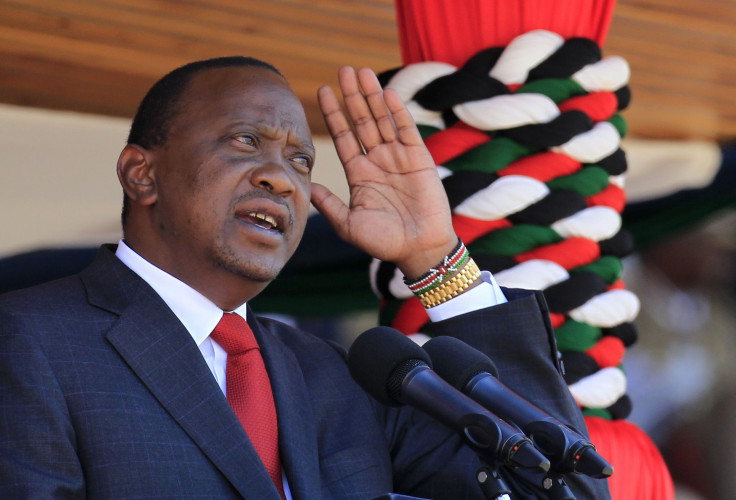International Criminal Court Effectiveness: Kenyatta Decision A 'Devastating' Blow

The International Criminal Court has faced many challenges since its founding just over a decade ago, but perhaps none so dire as its decision to drop charges against Kenyan President Uhuru Kenyatta. ICC prosecutor Fatou Bensouda announced Friday that the court had withdrawn charges of crimes against humanity against the African leader, saying that the prosecution could not sustain the charges against him with the available evidence. The move dealt a devastating blow to the ICC’s fight against impunity while also highlighting some of its built-in limitations as an institution, experts said.
As the first head of state to be prosecuted by the court, the Kenyatta case posed a valuable test of the court’s capabilities. Since its founding 12 years ago, The Hague-based court has only successfully secured the convictions of two people -- both little-known Congolese warlords -- and many of the court’s most prominent indictees, including Sudanese President Omar al-Bashir and Saif al-Islam Gaddafi, remain at large. This record has raised criticism of the court's ability to fulfill its mandate of holding the unaccountable to account.
The decision to drop the charges against Kenyatta is a “devastating setback," Elizabeth Evenson, senior international justice counsel at Human Rights Watch, said. “I can only imagine how disappointing it will be for the Kenyans looking to the ICC for justice,” she said.
Kenyatta had been facing five counts of crimes against humanity for allegedly orchestrating the violence that followed Kenya’s election in 2007, when more than 1,000 people were killed and 600,000 were displaced, according to the BBC. “The role of the Kenyan government has to be kept very clearly in the picture," Evenson said. "It dragged its feet on assisting the court, and tremendous pressure was placed on anyone speaking up for justice."
Bensouda emphasized the hurdles created by the Kenyan government in a statement released Friday. “The Kenyan government's noncompliance has not only compromised the prosecution's ability to thoroughly investigate the charges but has ultimately impinged upon the chamber's ability to fulfill its mandate,” she said.
Activists claimed that dozens of witnesses scheduled to testify for the prosecution were pressured or bribed to withdraw their testimony. The massive propaganda campaign that the Kenyan government mounted against the court contributed to the climate of hostility against witnesses in Kenya, a key factor in hamstringing the prosecution’s effort, said Evenson.
The possibility that Kenyatta was cleared as a result of bribery is a disturbing one, however, the decision to withdraw the charges was correct given that there was insufficient evidence to prosecute the leader, Juliet Sorensen, an associate professor of law at Northwestern University law school in Illinois, said. “It's unfortunate because the court has not brought a lot of cases, and it has prosecuted and completed very few cases. As the court seeks to gain credibility, it has to rack up some numbers,” she said.
The court's efforts are hampered by the fact that it is entirely dependent on state parties for the arrest and prosecution of suspected war criminals, Sorensen said. “The ICC does not have its own police force.... It has a very limited jurisdiction and can only initiate a case in a very narrow set of circumstances. All of that is going to, by definition, cap the number of cases it is possible to bring,” she said.
The ICC was founded with the aim of ending impunity for perpetrators of the most serious crimes around the world. Though the Nuremberg and Tokyo trials that followed World War II helped the international community establish a precedent for trying war crimes and crimes against humanity, there was no permanent international court set up to address these issues. Following the Rwandan and Bosnian genocides in the 1990s, the need for a broad, permanent body to try these crimes became more of a priority, with 60 countries ratifying the court's founding document in 2002. Since then, the court has grappled with a number of issues around its dependence on state parties.
“It needs cooperation from governments. This is a key issue for the ICC and state parties. What more can the international community do to gain cooperation from governments? There needs to be a serious look at how the ICC community can collectively do better,” Evenson said. “The Kenyatta case throws into sharp relief the very steep challenges the court has in carrying out its mandate, which is a challenging one.”
Amid concerns about the ICC’s capabilities, it is also important not to forget the significance of international justice for many victims who have no other recourse, Sorensen said. “It's important that the victims in Kenya not be forgotten in a discussion of how best to achieve closure for the events that took place in Kenya in 2007 and 2008. If a country is unwilling or unable to prosecute, it's for those victims that the ICC tries to obtain measure of justice,” she said. “The ICC is trying to do a tough job in a tough situation.”
© Copyright IBTimes 2024. All rights reserved.












